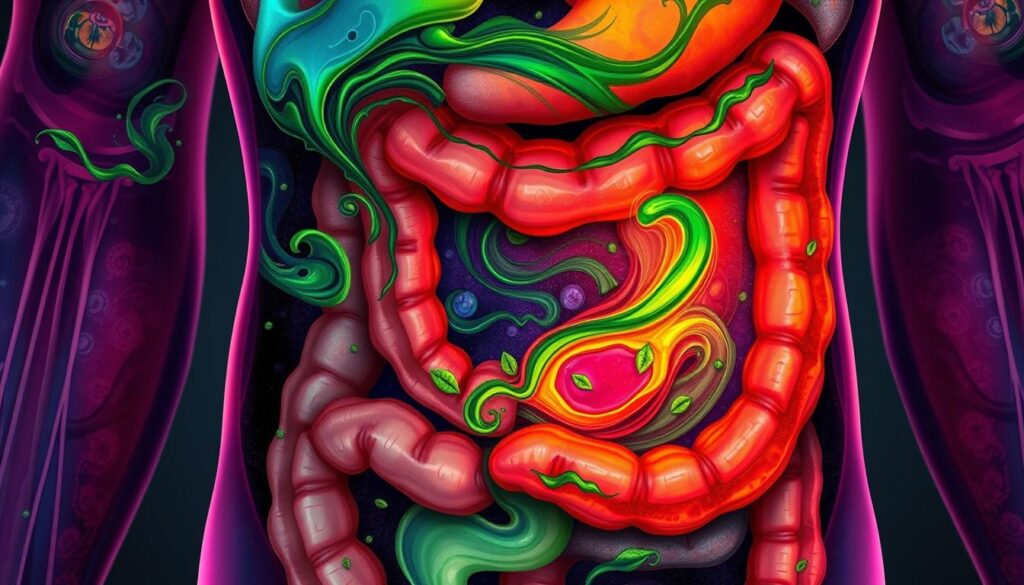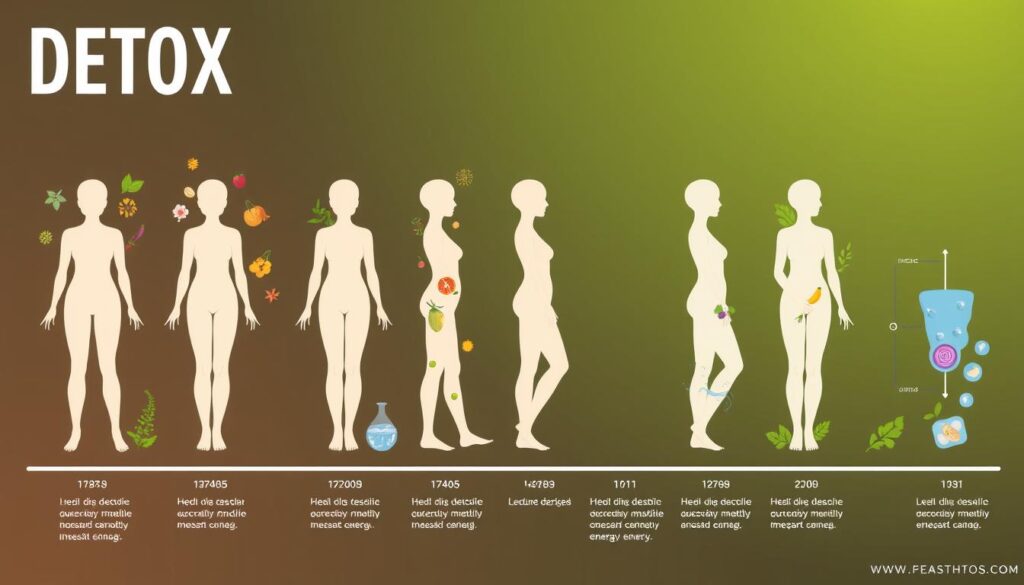Do you feel tired, have headaches, or notice mood swings? These could be signs your body is detoxing naturally. Our bodies are great at getting rid of bad stuff without needing fancy diets or supplements. But how do you know if your body is detoxing? Find out the 7 key signs your body is cleaning itself.
Key Takeaways
- The body’s natural detoxification process involves the kidneys, liver, digestive system, and other organs eliminating harmful toxins.
- Detox diets and supplements are often unsupported by research and unnecessary for toxin elimination.
- Recognizing the signs of natural detoxification can help you support your body’s cleansing process.
- Intense cravings, emotional changes, digestive issues, and physical symptoms like tremors may indicate your body is detoxing.
- Maintaining a balanced diet, staying hydrated, and getting adequate sleep are essential for supporting natural detoxification.
Understanding Natural Body Detoxification
The human body is amazing at getting rid of toxins and keeping itself healthy. This natural detox process uses several organs and systems. They work together to filter, break down, and remove harmful substances.
How Your Body Naturally Eliminates Toxins
The liver is key in natural detoxification. It breaks down alcohol and turns toxins into safe substances. The kidneys also play a big role, filtering waste and removing it through urine.
The digestive system, skin, and lungs help too. They remove toxins through feces, sweat, and breathing out.
The Role of Major Organs in Detoxification
- Liver: Metabolizes and converts toxins into harmless substances for elimination
- Kidneys: Filter waste products from the blood and remove them through urine
- Digestive system: Removes toxins through feces
- Skin: Eliminates toxins through sweat
- Lungs: Expel toxins through exhalation
Common Misconceptions About Detoxing
Many people think they need special diets or supplements to detox the body. But, the truth is, our bodies have a great natural detoxification system. It works all the time to keep us healthy.
By eating well, staying hydrated, and being active, our bodies can get rid of toxins on their own. We don’t need expensive or harmful “detox” products.
“The key to maintaining a healthy body is to support its natural detoxification processes, not to try and artificially cleanse it.”
What are the 7 signs that my body is detoxing?
Starting a detox journey is both exciting and challenging. Your body is working hard to get rid of toxins. Knowing the signs of detox helps you understand what’s happening and how to feel better.
- Intense Cravings: You might really want the things you’re trying to stop. This is normal as your body gets used to not having them.
- Nausea and Vomiting: Your body is getting rid of toxins, which can make you feel sick. This is a sign your body is working to clean itself out.
- Tremors and Shaking: Detox symptoms can show up as shaking or feeling unstable. This usually happens because your nervous system is adjusting.
- Anxiety and Irritability: You might feel more anxious or irritable during a body detox. This is because your body is adjusting to not having certain substances.
- Excessive Sweating: Sweating helps your body get rid of toxins. You might sweat more, even when you’re not moving much.
- Fatigue: Detoxing can make you feel really tired. It’s because your body is working hard to clean itself out.
- Headaches: Headaches are common during detox. Your body is getting rid of toxins that might have been causing pain or tension.
The detox symptoms can be different for everyone. They depend on what you’re detoxing from, how long you’ve been using it, and your body’s response. Talking to a healthcare professional can help you get the right support during detox.

“The body has an amazing capacity to detoxify itself, but sometimes it needs a little extra help to effectively eliminate accumulated toxins.”
Knowing the signs of detox helps you prepare and manage the process. This way, you can have a smoother detox journey and improve your health and well-being.
Intense Cravings and Emotional Changes
The detox process is tough, as the body and mind adjust. Cravings for the substance being stopped are a big challenge. These cravings come from the brain’s need for the substance, which it depends on for feelings and function.
People detoxing also face ups and downs in their emotions. They might feel anxious, irritable, or have mood swings. This is because their brain is trying to change without the substance.
Managing Withdrawal Symptoms
It’s key to handle withdrawal symptoms well. Therapy, mindfulness, and stress management help a lot. With help from addiction recovery staff, people can deal with the tough parts of detox.
Coping Strategies for Emotional Balance
Keeping emotions stable is crucial during detox. Deep breathing, journaling, and exercise can help manage feelings. Support from family, joining groups, and therapy also help keep emotions balanced.
“The road to recovery is not an easy one, but with the right support and coping strategies, individuals can navigate the detox process and emerge stronger, healthier, and more in control of their emotional well-being.”
Digestive System Changes During Detox
When the body detoxes, it often goes through digestive changes. You might feel nausea, vomiting, stomach pain, or diarrhea. These symptoms happen as the body gets used to not having the substance and tries to fix any damage.
The detox time can vary a lot. It can last from a few days to years. This depends on how long and how often you used substances, and how dependent you became. Different drugs stay in the body for different times. For example, opioids and cocaine can be found for 1 to 7 days, while benzodiazepines and methamphetamine can be detected for 2 to 3 days.
Detox programs usually last from 3 to 10 days. They help manage withdrawal symptoms from drugs or alcohol. There are two types of withdrawal: acute and post-acute. Acute needs immediate medical help for physical symptoms. Post-acute needs ongoing treatment for mental symptoms. After detox, it’s important to keep up with treatment to deal with addiction’s psychological and social sides.
To help the body heal and ease digestive issues during detox, nutritional therapy and IV amino acid infusions can help. These methods address the root causes of digestive problems. They help the body get back to its natural balance and function better.

“Proper nutrition and hydration are essential during the detox process to support the body’s natural healing abilities and minimize discomfort.”
Understanding digestive changes during detox is key to getting better. Being proactive and getting the right support can help manage these challenges. This way, individuals can have a successful recovery.
Physical Manifestations: Tremors and Shaking
When detoxing, people might feel tremors and shaking. This happens because their nervous system is trying to get back in balance. It’s especially common with alcohol and benzodiazepine detox, as the body misses the substances it’s used to.
Understanding Nervous System Reactions
The brain’s balance between GABA and glutamate can cause detox tremors. This imbalance happens when the body tries to fix the nervous system after being suppressed by substances.
How bad the symptoms are can depend on several things. This includes how long and how much someone used substances, their past experiences with withdrawal, and how their body reacts. Sometimes, tremors can lead to serious issues like seizures or delirium tremens, which are very dangerous.
When to Seek Medical Help
If tremors get worse or come with other scary symptoms, get medical help right away. A detox program can last from 3 to 10 days. It helps manage withdrawal symptoms safely. Doctors might use medicines like benzodiazepines or thiamine to help, and therapy to tackle the root causes of substance use.
It’s important to watch someone closely during detox. Symptoms can last a long time, even months or years. Getting professional help is key to safely going through detox.
“The imbalance between the inhibitory neurotransmitter gamma-aminobutyric acid (GABA) and the excitatory neurotransmitter glutamate in the brain due to alcohol consumption contributes to the development of alcohol detox shakes.”
| Withdrawal Symptom | Prevalence | Likelihood for Heavy Drinkers |
|---|---|---|
| Irritability | 46.8% | 35% more likely |
| Fatigue | 42.3% | 28% more likely |
| Sweating | 44.9% | 69% more likely |
| Stress or Anxiety | 48.6% | 28% more likely |
| Hand Tremors | 33.5% | 147% more likely |
Sleep Disruptions and Insomnia
The detox process can be tough, with the body changing a lot. Sleep problems, like insomnia, are common. Toxins, muscle pain, nausea, and headaches can mess with sleep.
Also, the body’s natural sleep cycle can be upset. This is because of changes in chemicals and stress hormones. The lack of certain substances and changes in neurotransmitters like GABA and glutamate can also affect sleep.
Research shows insomnia is more common in early recovery. A study in the Journal of Addiction Medicine found a big increase in insomnia in those just starting to recover.
Insomnia can last for a long time, causing anxiety, tiredness, and poor focus. It can also make you feel irritable and less enthusiastic. If not treated, it can slow down recovery and make relapse more likely.
A study by The National Institute of Health found that long-lasting insomnia can lead to daytime problems, psychological issues, and more. It can also make work harder and hurt relationships.

It’s important to tackle sleep issues during detox. Activities that reduce stress and a regular sleep schedule can help. Getting help from professionals can also make the detox process easier.
Excessive Sweating and Temperature Changes
Excessive sweating, or hyperhidrosis, is a common sign of detoxification. It’s a natural response as the body tries to get rid of toxins through the skin’s pores. Sweating helps flush out impurities and keeps the body temperature stable during detox.
The Science Behind Detox Sweating
Sweating is how the body cools itself and removes unwanted substances. During detox, your body may sweat more to get rid of toxins. This can make you feel unusually hot or cold.
Managing Perspiration Symptoms
- Stay hydrated by drinking plenty of water to replace fluids lost through excessive sweating.
- Wear lightweight, breathable fabrics that wick moisture away from your skin.
- Consider using a natural deodorant or anti-perspirant to help manage sweating.
- Avoid activities or environments that may trigger additional sweating during the detox process.
- Seek medical advice if excessive sweating persists or causes discomfort.
It’s important to note that sweating is a common detox symptom. The amount and duration can vary from person to person. As the detox process goes on, the sweating and temperature changes usually lessen, and the body regains its balance.
“Sweating is your body’s natural way of flushing out toxins and regulating temperature. Embrace it as a sign that your detox is working.”
Headaches and Fatigue During Detox
Starting a detox journey can be tough, with headaches and fatigue being common issues. These symptoms happen as the body gets rid of toxins. It’s like a big clean-up in your body.
Headaches often come from toxins suddenly entering your blood. This can cause inflammation and mess with blood flow to your brain. Also, if your liver isn’t working right, toxins can move around more easily. This can lead to headaches.
Fatigue is another common side effect. It’s because your body is focusing all its energy on getting rid of toxins. This makes you feel tired and weak. It shows how your body prioritizes health when it’s stressed or full of toxins.
To deal with these symptoms, you need to try a few things. Drinking lots of water, doing some light exercise, and relaxing with activities like meditation or yoga can help. Also, talking to a healthcare professional is key. They can help make sure you’re detoxing safely and effectively.
Remember, the temporary discomfort of detox symptoms is a sign that your body is actively working to restore its natural balance and resilience. With patience and the right support, you can navigate this journey and emerge feeling refreshed, revitalized, and empowered.

Supporting Your Body’s Natural Detox Process
Starting a natural detox can greatly improve your health. Simple lifestyle changes can help your body get rid of toxins. Let’s look at some easy nutrition tips and the benefits of staying hydrated and exercising.
Nutrition Tips for Detoxification
Eating a balanced diet is key for detox. Include these foods in your meals:
- Cruciferous vegetables like broccoli, cauliflower, and kale, which contain compounds that can enhance detox enzyme activity.
- Antioxidant-rich berries, such as blueberries and raspberries, to help neutralize harmful free radicals.
- Garlic, turmeric, and other herbs and spices that can aid in the detoxification process.
- High-fiber foods like whole grains, legumes, and leafy greens to promote regular bowel movements and eliminate toxins.
Try to eat less processed foods, added sugars, and alcohol. These can build up toxins in your body.
Hydration and Exercise Benefits
Drinking enough water is vital for detox. Aim for 64 ounces (8 glasses) a day. Herbal teas, like dandelion tea, can also help.
Exercise boosts detox too. Activities like cardio and yoga help remove toxins through sweat. Exercise also improves circulation and metabolism, helping organs work better for detox.
By following these tips on nutrition, hydration, and exercise, you can help your body detox naturally. This will lead to a healthier, more vibrant you.
The Timeline of Detox Symptoms
The detox process is a tough but important step towards recovery from addiction. The time it takes for detox symptoms to show up varies. It depends on the substance and the person. Knowing the general pattern can help a lot.
Detox symptoms usually start within a few hours or days after the last use. The worst of these symptoms often happens in the first 3-7 days. After that, things start to get better. But cravings can last longer as the body and mind try to get back to normal.
For alcohol detox, symptoms like nausea, headaches, and anxiety can start as early as 10 hours after drinking. These symptoms get worse over the next 1-2 days. You might also feel tremors, have trouble sleeping, and your heart might beat faster. The worst of it usually happens between days 5-7, with symptoms like hallucinations, seizures, and delirium tremens. But, by days 8-14, things start to get better as your body heals.
Drug detox follows a similar pattern. Symptoms start mild in the first 1-2 days, get worse on days 3-4, and peak on days 5-7. You might feel sick, have muscle aches, anxiety, and trouble sleeping. But, by days 8-14, these symptoms start to fade as your body gets back to normal.
It’s key to remember that detox is different for everyone. Things like how long you’ve been addicted, the substance, and your body’s response can affect how you feel. Getting help from a doctor during detox can make a big difference in your recovery.

The detox process is a vital step towards getting your health back. Knowing what to expect can help you prepare and get the support you need. It’s a journey that can change your life for the better.
When to Seek Professional Help
While our bodies can detox naturally, sometimes we need detox support from experts. If detox symptoms are severe or dangerous, it’s time to see a doctor.
Looking for medical detox is key when quitting drugs or alcohol. Withdrawal can be unpredictable and risky, especially with substances like alcohol, opioids, or benzodiazepines. Signs like severe tremors, seizures, or ongoing bad symptoms mean you need professional help.
| Substance | Typical Detox Timeline | Potential Complications |
|---|---|---|
| Opioids | 4 to 10 days | Withdrawal peaks within 8 hours to 4 days |
| Benzodiazepines | Months to years | Withdrawal peaks within the first 2 weeks |
| Alcohol | 1 to 2 weeks | Withdrawal peaks within 1 to 2 days; risk of seizures and Delirium Tremens |
A doctor can make detox safer and provide the right medical care. They might use medicines to help with withdrawal symptoms. They also help with any mental health issues that might be part of the detox process.
Getting professional help during detox can make it easier. It also boosts your chances of a successful recovery in the long run.
Conclusion
The human body has amazing ways to detox itself. You don’t need special diets or expensive cleanses to stay healthy. Eating well, exercising, drinking enough water, and getting enough sleep help your body get rid of toxins.
Detox symptoms like tiredness, headaches, or stomach issues don’t mean you’re sick. They show your body is healing itself. See these signs as a good thing, showing your body is working to clean itself out. Focus on living a healthy lifestyle.
If you’re worried about detoxing or have lasting symptoms, talk to a doctor. They can give you advice that fits your needs. With the right help, you can boost your body’s detox abilities and stay well for a long time.





